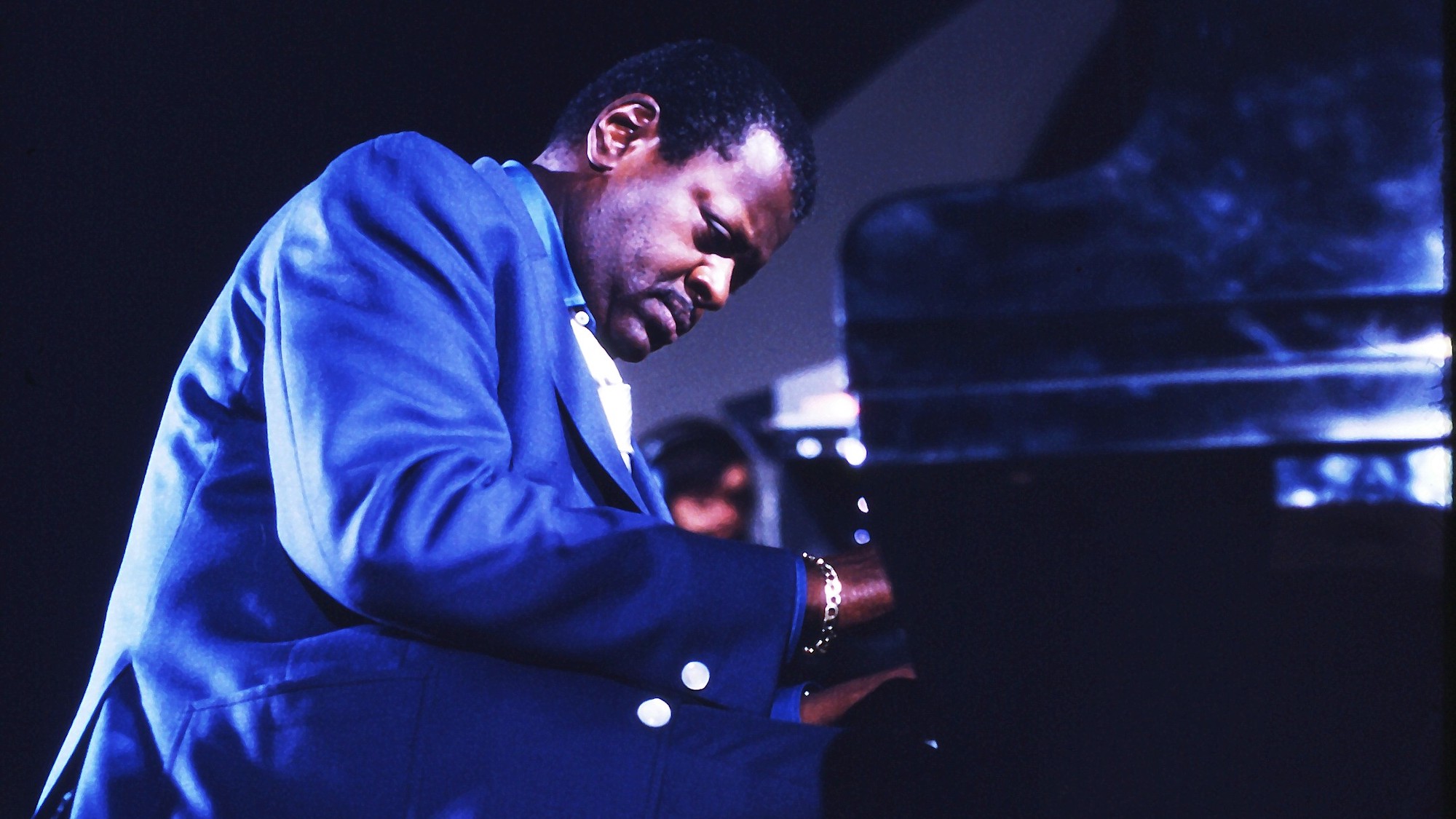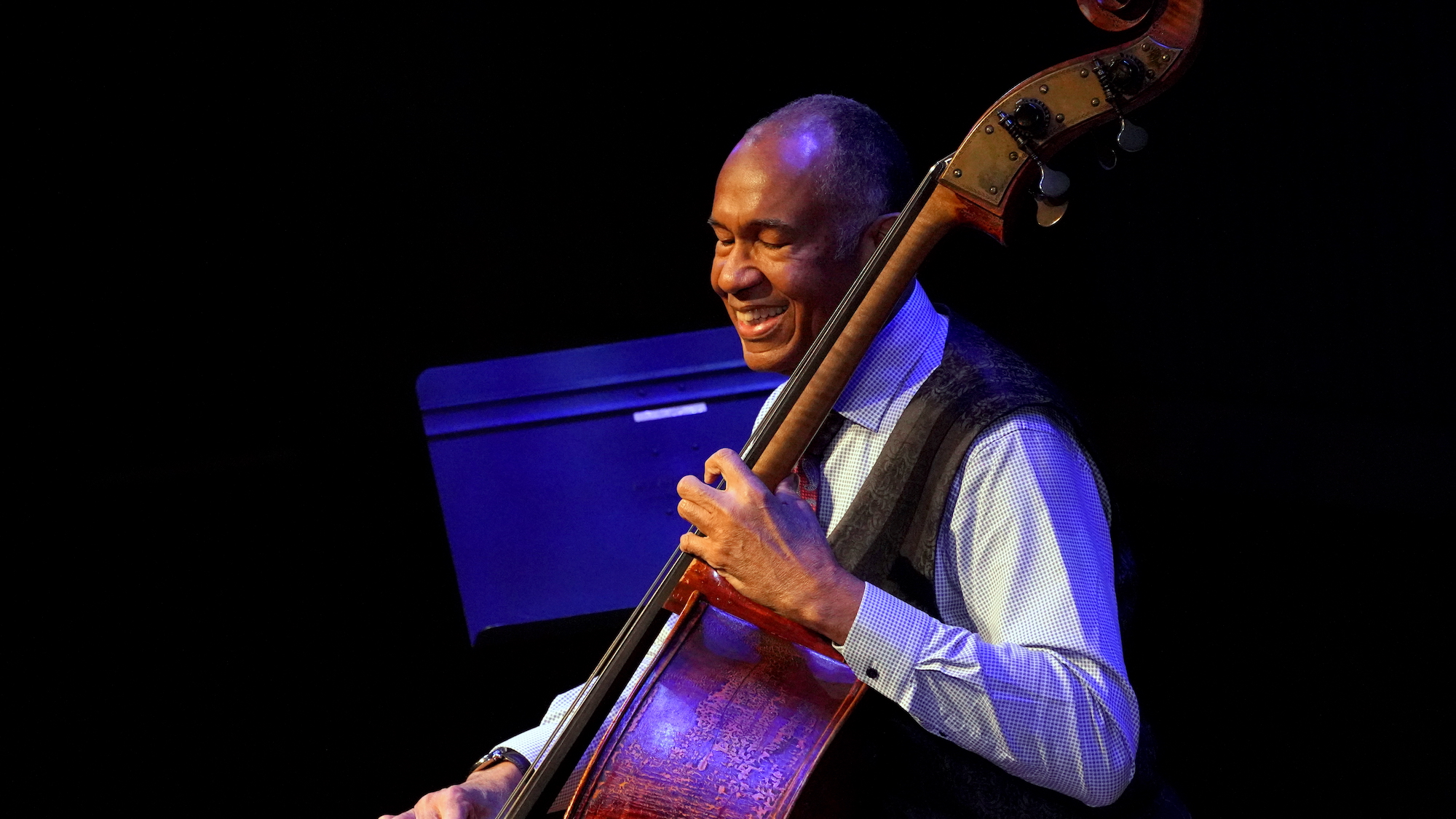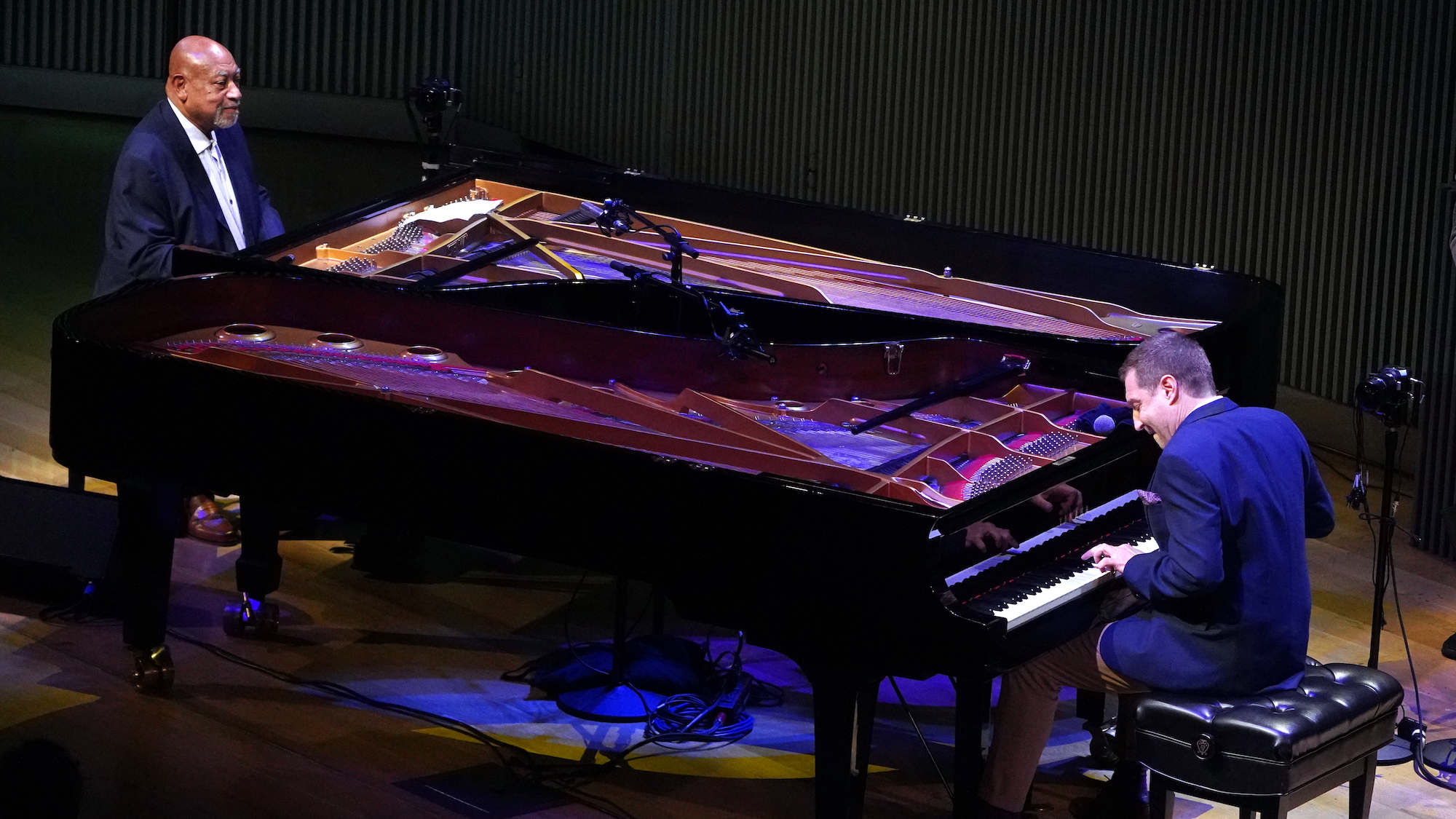June 03, 2024
History in the Making: Performing Oscar Peterson's The AFRICA Suite
By Richard Scheinin
Staff writer Richard Scheinin gives us a preview of the historic U.S. premiere of the late piano genius’s lost masterwork, performed at Davies Symphony Hall on 6/12.

Oscar Peterson
About five years ago, John Clayton, the Los Angeles-based bassist and arranger, hit the “play” button on his sound system and was suddenly in the presence of the late Oscar Peterson. Alone in his home studio in Toronto, Peterson was at the keyboard, composing an extended suite that he never quite finished and ultimately set aside. Now, decades later, Clayton was hearing it: tune after tune, some fully formed, others more like fragments, but everything bearing the stamp of Peterson, the master: “It was surreal,” says Clayton, getting this private view into Peterson’s creative process: “I remember when I first got the tapes. Sitting down to listen to them, I thought, `I’m getting a peek into this crypt — into this until-now closed treasure chest.’”
Clayton — co-leader of the crackerjack Clayton-Hamilton Jazz Orchestra — went on to arrange (and in some cases complete) each of the eight movements of Peterson’s 45-minute The AFRICA Suite. He capped it off with a ninth movement, his arrangement of Peterson’s civil rights anthem “Hymn to Freedom,” from the early ‘60s. In February 2020, The AFRICA Suite was premiered to a sold-out audience in Toronto with an all-star Canadian big band and rhythm section, featuring pianist Benny Green, Peterson’s friend and protege. “I felt like I could really feel Oscar’s spirit,” Green recalls of that night. “I felt that he wholeheartedly approves of how the music is being treated.”

John Clayton at SFJAZZ, 5/20/21 (photo by Rick Swig)
On June 12 at Davies Symphony Hall in San Francisco, SFJAZZ will present the suite’s U.S. premiere with the Clayton-Hamilton Jazz Orchestra featuring Green, once again. (The Orchestra’s co-leader is drummer Jeff Hamilton.) Part of the build-up to Peterson’s August 2025 centenary, the program will also include his Canadiana Suite, arranged for big band by Clayton, as well as solo piano tunes and trio numbers composed by or associated with Peterson. Along with Green, the evening will feature piano maestros Kenny Barron, Tamir Hendelman, and Gerald Clayton, John’s son, who was raised on a diet of Peterson albums from his dad’s collection, memorizing many of the songs, solos, and distinctive small-group arrangements.
John Clayton was merely passing along his obsession. In the late ‘60s, when he was 16 years old, he recalls, he went to the public library in Venice, CA, borrowed a copy of The Trio: Live from Chicago — a popular Peterson LP with bassist Ray Brown and drummer Ed Thigpen — and became a convert. “My mind was blown,” he says. “I started playing along with his records, and I would dream about playing with Oscar.” He went on to study with Brown, through whom he met Peterson and established a friendship. And years later, while touring with the Count Basie band on a bill opposite Peterson’s trio, Clayton finally did get the chance to jam, informally, with his hero: “I felt inadequate. I felt like I really embarrassed myself — but I had a great time. I was playing with Oscar Peterson!”
Born and raised in Montreal, Peterson is celebrated for his virtuoso improvisations, with their orchestral harmonies and whip-smart rhythmic sensibility — like a latter-day Art Tatum. But he was also a prolific composer who tended to work things out at the keyboard. “He preferred to play it, to hear it,” explains his wife, Kelly Peterson. Since his death at age 82 in 2007, she has combed through his trove of home-studio recordings, unearthing many unreleased compositions, and recruiting other pianists to bring them to life. A raft of previously unheard tunes is found on Oscar, With Love, a 2015 recording that she produced. It features many of Peterson’s admirers, including Green, Barron, and Gerald Clayton, as well as Ramsey Lewis, Chick Corea, Hiromi, Monty Alexander, and Michel Legrand. They recorded at the Peterson home on the Bösendorfer Imperial grand piano in his studio.
Even after that project, plenty of Peterson’s compositions remained on the shelf, she says, including The AFRICA Suite which she believes was composed between 1979 and the mid-’80s. “By the time I married him in 1986,” she says, “it was done. And Oscar spoke of it so often. He had never played it in its entirety and I wanted it to be heard, because it’s a major piece and I thought it was important to bring that to life. I felt I was fulfilling a dream for Oscar by having it performed.”
She first approached John Clayton about the project in 2012. Years would pass before the project gathered steam and Clayton sat down with that “treasure chest” of private recordings. But he remembers the original conversation: “Kelly said, `Oscar had all these pieces that he had started and I’ve got some different recordings and some are just partial renditions, just him experimenting and searching, and all of it is for this AFRICA Suite, and would you mind hearing it and arranging it and maybe finishing it?’ Wow! Zero pressure,” Clayton says, jokingly, “finishing this piece that Oscar Peterson wrote!”
When Peterson was still alive, three of its movements had found their way into his small-group repertoire: “Nigerian Marketplace,” bustling with energy; “Peace for South Africa,” a slow blues in 6/8 time that feels like a spiritual and goes to the core; and “The Fallen Warrior,” composed in the early ‘80s for Nelson Mandela while he was imprisoned under the South African apartheid regime. When Mandela was freed in 1990, Oscar and Kelly Peterson were “glued to the television for that historic moment — jubilant,” she says. Eight years later in Toronto, Canadian Prime Minister Jean Chrétien introduced Peterson to Mandela, now the president of South Africa, during a state visit. Mandela had never heard “The Fallen Warrior,” it turns out, because Peterson’s music — and music by Black jazz musicians, generally — had been suppressed under apartheid.
In its finished form, The AFRICA Suite unfurls like “a portrait painted of the continent,” Kelly Peterson says. “There’s one tune called `Soweto Saturday Night’ and it sounds like you’re going out and having a great time, with lots of dancing. Other parts are maybe taking you through a savannah or on a safari. It’s Oscar painting these images and trying to capture an essence.” The pianist never visited Africa, but he “saw it in his mind, through his imagination.”
He composed the suite on piano and synthesizers, recording everything on 2-inch reel-to-reel tapes that were later digitized by his wife. Clayton remembers achieving a deep focus as he listened to the home-studio recordings: “I was allowing myself to be inspired by all of it and doing my best to get into his head, based on the synthesizer sounds that he chose. Sometimes it was very reedy and that would usually mean transferring that to woodwinds or saxophones. At other times, it just felt like he was searching, focusing on melody, and he really didn’t have an instrument in mind. But I really did try and go with what I imagined he would’ve wanted.” His arrangements grew to include French horns and multiple percussionists: “It was always in my mind to present it in a really big fashion.”
Clayton also sequenced the movements of The AFRICA Suite: “Having heard him perform so many times, I knew how his set flow would go,” he explains. “And I just kind of applied that. What would be the strong Oscar opener, and where would that lead him, and where should the ballad things be placed within that, and how would he end it?”
Benny Green credits Clayton with “putting these movements together in a way that makes a very powerful, wordless emotional statement. I want to highlight how key it’s been that Kelly called on John to do this, because it was a lot to put together. There are so many emotions that get touched on, that are enlivened and explored, and I’m just unspeakably honored to be part of it — to get to play Oscar Peterson’s music.”
Kelly Peterson promises more projects leading up to her husband’s 2025 centenary, including additional performances of The AFRICA Suite in the United States, Canada and internationally, as well as other “special events.” Inevitably, such programs include members of what she describes as Peterson’s musical “family” — which includes Clayton (thanks to his Ray Brown connection), drummer Hamilton (who played in Brown’s trio) and Green (another Brown alumnus).
Green was 29 when he met Peterson in the fall of 1992. He had spent years with Betty Carter’s trio and Art Blakey and the Jazz Messengers and had several recordings as a leader under his belt for Blue Note Records. But coming face to face with “the living and timeless embodiment of virtuosity” — that’s what he calls Peterson — was unnerving.
They met at a club in Toronto called the Bermuda Onion, where Green was performing with Brown’s trio. Before the show, he remembers, “Oscar and Kelly were seated with Ray Brown and Jeff (Hamilton). So I went over to shake hands with Oscar, and he said, `I’ve heard good things about you, young man.’”
This only increased his anxiety, so Green — who had studied Peterson’s recordings, seen him perform live, and been “deeply impacted” by him as a player — went and hid in the basement dressing room.
A large photo of Peterson was hanging on the wall.
Apparently, there was no escaping the situation. After the show, Green ratcheted up his nerve and thanked Peterson for coming. They shook hands again — “he had big hands, like Rachmaninoff” — and that’s when Peterson said to him, “It’s a pleasure to hear the piano played the way I like to hear it played.”
How did Green feel? “I was just sort of enthralled by the whole moment, and I took him seriously. Anyone who hears him play can realize that Oscar doesn’t jive when it comes to music, so I had to accept it. I was glad I didn’t stay hidden in that dressing room!”

Kenny Barron and Benny Green at SFJAZZ, 10/10/22 (photo by Rick Swig)
They exchanged phone numbers and home addresses and began a correspondence: “We would actually exchange letters, handwritten letters, which really compelled me to be articulate and have something substantial to say beyond, `What was it like to play with Louis Armstrong?’ And we became friends, and Oscar telephoned me — I guess it was the winter of ‘92 going into ‘93 — to tell me he was being given an award from the Glenn Gould Foundation in Toronto and part of the award entailed him to select a younger artist to receive a protege prize. And it was not just for music, it was for communication, and he was selecting me. I told him I felt grateful and also inwardly conflicted because there’s so many pianists that have more chops than me or more verbatim command of Oscar Peterson’s vocabulary. But Oscar really believed in me. And I struggled and Oscar knew this, and I was still grappling with that at the time of Oscar’s passing. I’ve had so many moments where Oscar’s spirit has just come to me while I’m listening to his music and just kind of healed me.”
Green describes a few of the lessons he learned from Peterson — about consistency, attention to detail, the secrets of rhythm, the necessity of hard work, and not making excuses. He talks about the “unfathomable challenge” of performing The AFRICA Suite in San Francisco this month. He recalls the piece’s debut in Toronto four years ago: “My goodness, when we came together to rehearse and perform, there was so much magic in the air. Oscar’s music is so positive and life-affirming. He is the torchbearer, and we have to answer to him because he is one of the people that’s shown us how beautiful the piano can sound. And his recorded legacy is here for all time, upholding the glory of the music that’s been named jazz. It’s alive, and he is the champion.”

The U.S. premiere of Oscar Peterson’s The AFRICA Suite is at Davies Symphony Hall on 6/12, featuring the Clayton-Hamilton Jazz Orchestra with Benny Green, Robert Hurst, Kenny Barron, Gerald Clayton, Russell Malone, and more. Tickets and more information are available here.
A staff writer at SFJAZZ, Richard Scheinin is a lifelong journalist. He was the San Jose Mercury News' classical music and jazz critic for more than a decade and has profiled scores of public figures, from Ike Turner to Tony La Russa and the Dalai Lama.
